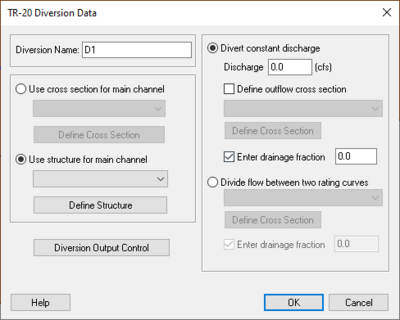WMS:TR-20 Diversion Data
TR20 allows flow to be diverted from an outlet or drainage basin. This flow can be thought of as leaving the normal drainage system at that point. It can be retrieved at a downstream outlet where the diverted flow then contributes to the flow at that outlet. If no downstream retrieval outlet point is specified, the flow simply leaves the system at the diverted outlet point and never returns.
Diversion Name – The Diversion Name is used to associate resulting hydrographs with the appropriate diversion when reading a hydrograph file after a TR-20 run. The nave should be unique and no longer than six characters.
Inflow Parameters – The inflow for the diversion can be determined in one of two ways: either by using a cross section for the main channel or by using a structure for the main channel. Cross-sections are defined using the same dialog as for reaches as described in the section on channel routing. Structures are defined in the same way as structures for reservoir routing.
Outflow Parameters – The outflow for a diversion can be specified in one of two ways. In the first method, a constant flow is diverted. For this method, define what this constant outflow is. Also define a cross section and the decimal fraction of the drainage area to be associated with the main channel output hydrograph (the drainage area fraction) here. In the second method of defining a diversion, define the cross Section for the diversion. TR20 uses a rating curve to divide flow between the two Cross Sections that comprise the diversion. Define the decimal fraction of the drainage area to be associated with the main channel output hydrograph (the drainage area fraction) using this method as well.
Related Topics
| [hide] WMS – Watershed Modeling System | ||
|---|---|---|
| Modules: | Terrain Data • Drainage • Map • Hydrologic Modeling • River • GIS • 2D Grid • 2D Scatter |  |
| Models: | CE-QUAL-W2 • GSSHA • HEC-1 • HEC-HMS • HEC-RAS • HSPF • MODRAT • NSS • OC Hydrograph • OC Rational • Rational • River Tools • Storm Drain • SMPDBK • SWMM • TR-20 • TR-55 | |
| Toolbars: | Modules • Macros • Units • Digitize • Static Tools • Dynamic Tools • Drawing • Get Data Tools | |
| Aquaveo | ||
